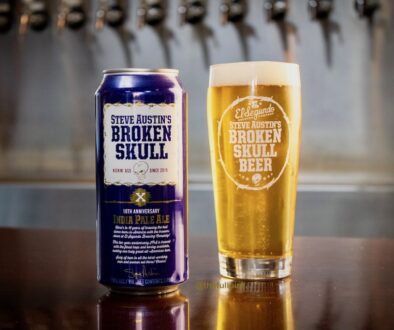Beachwood Brewing Issues Statement on ABI Owned TheBeerNecessities.com
(Long Beach, CA) – Beachwood Brewing of Long Beach and Huntington Beach, CA issue a very strong statement in regards to a first hand experience dealing with AB-In Bev owned TheBeerNecessities.com website. The Full Pint will be following along and covering this developing story, as ABI has a few new online properties which seem to be aimed at further blurring the lines between independent breweries and their own brands. Read on for Beachwood’s statement.
“Several months ago, we were contacted by a freelance journalist who wanted to write about Beachwood BBQ and Brewing for a new blog that was to be edited by beer writer Ethan Fixell. The blog wasn’t live yet, so we were unable to check its validity, but we are a small business who supports other small businesses so we agreed to the interview.
After the story was published on TheBeerNecessities.com last week, we discovered that this blog is not an independent publication but is actually a new venture owned and published by The High End, AB-InBev’s “craft beer” division.
READ: The AB-InBev “Why Don’t They Like Us” Tour Continues
As an independent brewery that has fought hard against the predatory business practices of macro beer for almost a decade, we wholly reject this free promotion and all that it stands for. We don’t want it. We don’t need it. And if we knew that it would be used, in our opinion, to help AB-InBev in their intensifying quest to dilute the de nition of “craft,” we certainly would have refused participation. With this in mind, we ask The Beer Necessities to remove the story.
Sure, we should have looked deeper into the blog’s ownership – and we certainly will in the future — but we also never in a million years would have thought that a multi-national corporation such as AB-InBev would be entering the blogging business.
The fact that they have shows the lengths that big beer is willing to go to fool you, the consumer, into thinking that their acquired “craft” brands are truly craft beer and that they (AB-InBev) have somehow come to share the values of independent breweries.
In his letter from the editor, Fixell addresses his decision to partner with The High End on The Beer Necessities by saying that we live in a “post-craft” world where anyone who is making good beer deserves to be recognized. While some of AB-InBev’s “craft” brands do make good beer, Fixell’s statements are puzzling to say the least.
Drinkers once supported craft beer not only because it’s a higher quality product, but also because it directly supports small businesses and the communities in which they reside. When AB-InBev uses distributor incentives and massive marketing budgets to get you to make that emotional purchase with their own brands, their objective is to get you to believe they are community-driven small businesses. But their brands are not of our community. With annual revenues in excess of 45 billion dollars, they are not us. They are not even an American company, much less a local one.
We feel there’s no coincidence that The Beer Necessities chose to feature Beachwood as a successful brewpub just as AB-InBev launches full force into opening its own brewpubs in new markets. Some of you may write this off as conspiracy theory talk, but we are entering a whole new battle for the hearts and minds of the consumer. When The High End now has media arms that are actively supporting us in order to make the correlation to consumers that we’re all the same, they are most certainly trying to move us into a “post-craft” era. However, we reject this completely. In our opinion, AB-InBev has not embraced “craft” brands and quality beer because they share the values of independence and creativity that have fueled the craft beer revolution; they do so because it furthers their only real interest—the endless pursuit of pro ts.
So don’t call us craft — call us independent. Because AB-InBev’s long list of acquired “craft” brands (Golden Road, Goose Island, Breckenridge, 10 Barrel, Karbach, Elysian, Blue Point, Four Peaks, Devil’s Backbone, Wicked Weed) are not independent. We continue to believe that it matters who makes your beer!”





Episode 178 - The Shot Heard Round The World | The Craft Beercast
May 11, 2017 @ 4:01 pm
[…] Post-craft core […]
Craft Brewing on Easy Mode: Wicked Weed Brewing & AB-InBev • thefullpint.com
May 11, 2017 @ 9:45 am
[…] READ: Beachwood Brewing Issues Statement on ABI Owned TheBeerNecessities.com […]
May 5, 2017 @ 4:19 pm
Thank you a lot for sharing this with all people you really realize what you’re talking about!
Bookmarked. Please also talk over with my site =).
We could have a link alternate agreement among us http://surfshop.com.au/classifieds/author/kaseymunger/
May 4, 2017 @ 6:34 pm
I’m NOT a brewer, but I did experience the reverse of this whole process: I took a department I built at a multinational public corporation and turned it into an independent company a few years back, when said multinat lost interest.
The differences are stark. Now, for example, when balancing the cost of high-quality processes and materials against the need for profit, I often spend more than the minimum I can get away with. I know that a big part of what makes a best-possible product is the cumulative result of these decisions, and that I don’t have to squeeze every dime to see a profit, since I’m not working in a bottom-feeding market.
Back at the multinational, when I had to go in front of bean counters once a month to justify why I was spending *their* money in unnecessary ways, it didn’t always go well. I was reminded of this the last time I tasted a Sculpin: Ballast Point now exists in an environment where I’m sure every decision is scrutinized, and the mental fatigue of justifying a laundry list of not-the-cheapest-available choices must be huge.
From a macroeconomic point of view, the main result of making an indy into part of a multinat is that the parent company takes a vig (as the Sopranos called it), which is more likely to land in a bank in the Cayman Islands than to be spent on appliances in the brewer’s home town.
Yes, tying up to a major company lends certain types of stability (unless they have a board meeting where your division shows up in red for the quarter and they decide to chase a different shiny object), but screw that.
BTW, I have lots of sympathy for the people who sold. If anyone wants to buy my company for $5 on the dollar, let’s talk, as long as I don’t have to stick around after I cash my check.
May 4, 2017 @ 5:44 pm
Suggested correction: Beachwood of Seal Beach and Long Beach.
May 4, 2017 @ 10:50 am
Bryce, I think you misunderstand what’s at stake here. Firstly, it’s obvious nobody goes to work every day just because they want to. We call that a hobby. We all work to make a living. But what’s better than just making a living? Making a living doing something you like to do and care about. That’s the fundamental difference between independent brewers and multinational conglomerates. AB InBev exists as an organization solely for shareholder value, nothing more. They gain shareholder value by eliminating their competition, which they do through various means, mostly centered on mergers and acquisitions. The more labels they own, the more shelf space they control, and the more anti-competitive strategies they can employ. They are under relentless pressure to keep costs down and sales up. A competitive market doesn’t bother me and is generally better for all of us, but I get mad when companies use their market clout to compete unfairly and deceptively and nothing is more deceptive than a global industrial brewer trying to sell itself as “craft”.
The thing with the hot brewers selling tickets for people to stand in line isn’t about being unfair to the consumer it’s about managing demand instead of just ratcheting up the price to where only a few people could afford it, like scotch whiskey or bourbon makers do. I can afford to buy the best beers in the world if I’m willing to wait in line but I can’t touch the best cognac in the world.
We do not need to look past the idealism you are dismissing. That idealism is the very thing that makes us want to buy and drink independent craft brews and it’s the reason they are successful and it’s the reason the huge conglomerates are now targeting them for competition.
I personally know many brewers and know why they do what they do. They are passionate people who embrace their communities and care personally about what they want and are committed to brewing the best beers they can. For the mega-brewers the bottom line is just that: the bottom line, nothing else matters. This whole push is just ABI’s marketing bullshit. Don’t be fooled.
May 4, 2017 @ 7:18 am
Sorry if this posts twice: Much as it pains me I must generally agree with Bryce’s comment but with a tweak. If someone opened a brewery more than 6 years ago I’d say their reason was for profit, but recently most new breweries are being opened by millennial homebrewer’s who don’t think of it as a business, and sadly they will eventually pay the price and go bankrupt because of it. They think that if they have a beard and perhaps some tats no one will notice that they are making horrible tasting beer. It doesn’t matter to me who ‘owns’ a brewery. I care about quality, especially if I am paying a premium price for it. Also, to say that ABI lacks creativity is a stretch, light beer when it was first introduced was creative, bad beer with lime in it is creative and I’ve had some great tasting ABI beers at GABF years ago that their test brewery has made such as a oak aged vanilla stout and they were creative with it as they added the oak staves directly into the fermenter. ABI isn’t evil, yes they are an empire but no one can really say they are evil, just look at the craft brewers that they are making rich through buyouts.
May 4, 2017 @ 7:03 am
Much as it pains me I must generally agree with Bryce’s comment but with a tweak. If someone opened a brewery more than 6 years ago I’d say their reason was for profit, but recently most new breweries are being opened by millennial homebrewer’s who don’t think of it as a business, and sadly they will eventually pay the price and go bankrupt because of it. They think that if they have a beard and perhaps some tats no one will notice that they are making horrible tasting beer. It doesn’t matter to me who ‘owns’ a brewery. I care about quality, especially if I am paying a premium price for it. Also, to say that ABI lacks creativity is a stretch, light beer when it was first introduced was creative, bad beer with lime in it is creative and I’ve had some great tasting ABI beers at GABF years ago that their test brewery has made such as a oak aged vanilla stout and they were creative with it as they added the oak staves directly into the fermenter. ABI isn’t evil, yes they are an empire but no one can really say they are evil, just look at the craft brewers that they are making rich through buyouts.
May 4, 2017 @ 6:56 am
Hey Dan, please clean up the typos.
May 4, 2017 @ 6:29 am
I adore and respect Beachwood but it should be said that the website is very clear about its ownership. The writer may not have felt it necessary to mention it but anyone can easily find that info on the site. I realize it wasn’t live at the time but now a simple click on the site will tell you. In full disclosure, my first story appears on the site today.
May 3, 2017 @ 4:51 pm
I have to say this article made for hilarious reading.
In your article you state
“AB-InBev has not embraced “craft” brands and quality beer because they share the values of independence and creativity that have fueled the craft beer revolution; they do so because it furthers their only real interest—the endless pursuit of profits”
The real reason why most craft breweries go into business is to make a profit. Hence why they are a business, selling their beer and not just some guy in his garage brewing and experimenting for fun. To think otherwise, is looking at the industry through rose tinted spectacles or more to the point, idiotic.
The creativity you speak of, is all aimed at making a beer successful, making a beer standout in an over saturated marketplace…why? To increase sales and thus profits. Proof? Craft breweries charge a premium for their special release beers and make people wait in line to get their hands on them. If they cared so much about their community and values – they wouldn’t do this. They would make it available for a normal price and not make people buy tickets just to get in line. If they truly cared for their community in the way you state, wouldn’t they welcome a company coming in with the power to help them really grow and in turn create more jobs for their local community?
You and many others need to look past this idealism of craft breweries being some local individual who doesn’t care to turn a profit and just wants to help his local community through his independent values and creativity. It’s simply not true and it makes you look like a fool, for falling under the trap of the same marketing techniques that the brewery giants use. Instead, realize craft breweries are just as much a part of the corporate machine as the brewery giants are.